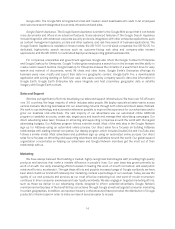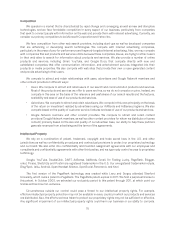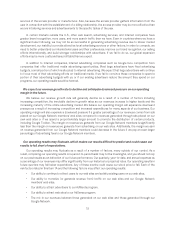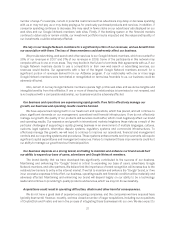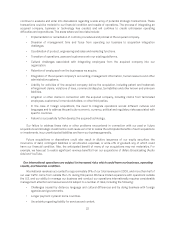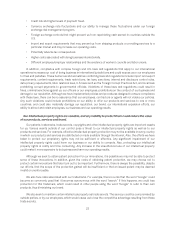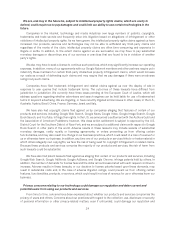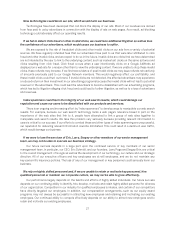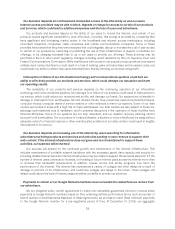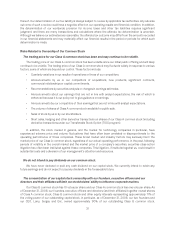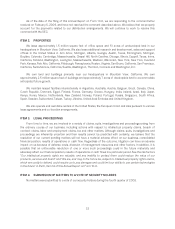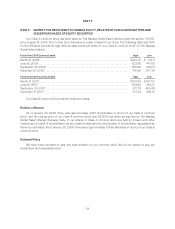Google 2008 Annual Report Download - page 40
Download and view the complete annual report
Please find page 40 of the 2008 Google annual report below. You can navigate through the pages in the report by either clicking on the pages listed below, or by using the keyword search tool below to find specific information within the annual report.We are, and may in the future be, subject to intellectual property rights claims, which are costly to
defend, could require us to pay damages and could limit our ability to use certain technologies in the
future.
Companies in the internet, technology and media industries own large numbers of patents, copyrights,
trademarks and trade secrets and frequently enter into litigation based on allegations of infringement or other
violations of intellectual property rights. As we have grown, the intellectual property rights claims against us have
increased. Our products, services and technologies may not be able to withstand any third-party claims and
regardless of the merits of the claim, intellectual property claims are often time-consuming and expensive to
litigate or settle. In addition, to the extent claims against us are successful, we may have to pay substantial
monetary damages or discontinue any of our services or practices that are found to be in violation of another
party’s rights.
We also may have to seek a license to continue such practices, which may significantly increase our operating
expenses. In addition, many of our agreements with our Google Network members and other partners require us to
indemnify these members for certain third-party intellectual property infringement claims, which would increase
our costs as a result of defending such claims and may require that we pay damages if there were an adverse
ruling in any such claims.
Companies have filed trademark infringement and related claims against us over the display of ads in
response to user queries that include trademark terms. The outcomes of these lawsuits have differed from
jurisdiction to jurisdiction. We currently have three cases pending at the European Court of Justice, which will
address questions regarding whether advertisers and search engines can be held liable for use of trademarked
terms in keyword advertising. We are litigating, or have recently litigated similar issues in other cases, in the U.S.,
Australia, Austria, Brazil, China, France, Germany, Israel, and Italy.
We have also had copyright claims filed against us by companies alleging that features of certain of our
products and services, including Google Web Search, Google News, Google Video, Google Image Search, Google
Book Search, and YouTube, infringe their rights. In the U.S. we announced a settlement with the Authors Guild and
the Association of American Publishers; however, this class action settlement is subject to approval by the U.S.
District Court for the Southern District of New York, and we are subject to additional claims with respect to Google
Book Search in other parts of the world. Adverse results in these lawsuits may include awards of substantial
monetary damages, costly royalty or licensing agreements, or orders preventing us from offering certain
functionalities, and may also result in a change in our business practices, which could result in a loss of revenue for
us or otherwise harm our business. In addition, any time one of our products or services links to or hosts material in
which others allegedly own copyrights, we face the risk of being sued for copyright infringement or related claims.
Because these products and services comprise the majority of our products and services, the risk of harm from
such lawsuits could be substantial.
We have also had patent lawsuits filed against us alleging that certain of our products and services, including
Google Web Search, Google AdWords, Google AdSense, and Google Chrome, infringe patents held by others. In
addition, the number of demands for license fees and the dollar amounts associated with each request continue to
increase. Adverse results in these lawsuits, or our decision to license patents based upon these demands, may
result in substantial costs and, in the case of adverse litigation rulings, could prevent us from offering certain
features, functionalities, products, or services, which could result in a loss of revenue for us or otherwise harm our
business.
Privacy concerns relating to our technology could damage our reputation and deter current and
potential users from using our products and services.
From time to time, concerns have been expressed about whether our products and services compromise the
privacy of users and others. Concerns about our practices with regard to the collection, use, disclosure or security
of personal information or other privacy-related matters, even if unfounded, could damage our reputation and
24


